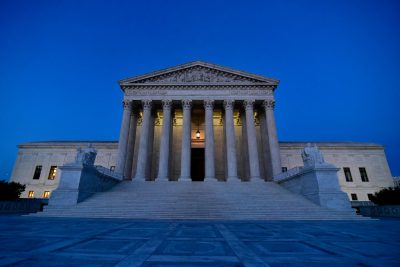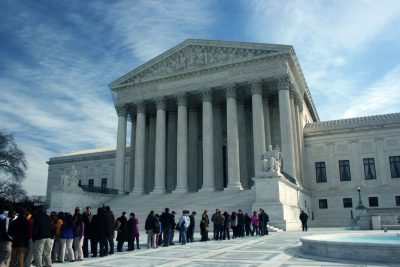Due Process and the Courts
What does the constitution say about due process?
The Fifth Amendment to the Constitution says clearly that no person shall be deprived of life, liberty, or property without the due process of law. Note that this says person, not citizen, and over the years the Supreme Court has consistently ruled that the Due Process Clause applies to all people in the United States.Do non-citizens have the right to due process in the U.S.?
Yes. The Constitution guarantees due process rights to all "persons," not just citizens. This means non-citizens, including undocumented immigrants, are entitled to fair treatment under the law. This includes the right to defend themselves in court. But recent Trump administration policies that speed up deportations and limit access to legal representation make it harder for non-citizens to get their fair day in court.- Access to legal representation Access to legal counsel is an essential part of our justice system and our democracy. In the criminal justice system, anyone facing even one day in jail gets a lawyer if they can't afford one. But immigrants facing deportation usually don't get that chance.The research is clear – the most effective way to ensure some level of due process for people navigating our complicated immigration system is for them to have trained attorney at their side. But Trump administration is now working to strip attorneys from as many people as possible, all in the name of increasing its deportation numbers. This attempt to eliminate basic due process will hurt people who already have few options.
- Fair day in court Due process guarantees that individuals have the opportunity to defend themselves in court. This includes non-citizens facing deportation.
Why is due process important?
We are seeing right now the importance of due process when it comes to President Trump's actions to carry out the so-called Alien Enemies Act, a 1798 wartime law that permits people to be deported outside of the normal framework of immigration law. President Trump has alleged that this law allows him to simply point at any person, declare them to be an alien enemy, and kick them out of the country without ever having a chance to see a judge. Thankfully, the Supreme Court said that is not true, and in a unanimous decision, ruled that people can challenge the Trump administration's invocation of the Alien Enemies Act. That is why due process is so important, because it means that no person can be rounded up and sent to another country without a chance to go to court and make the government prove their case.How is the American Immigration Council working to protect due process?
- We serve thousands of individuals in immigration detention centers through the Immigration Justice Campaign, our initiative with the American Immigration Lawyers Association. The Justice Campaign provides free legal services for immigrants who would otherwise have to navigate our complicated immigration system without a lawyer.
- We use the courts to demand a fair process for immigrants. Our litigation team is fighting back against the Trump administration’s blatant disregard for due process including filing a lawsuit challenging their illegal detention of immigrants in El Salvador’s notorious Terrorism Confinement Center (CECOT).

What’s Next in the Supreme Court Case on Expanded DACA and DAPA?
This week, the Supreme Court announced it would hear arguments in United States v. Texas. The highest court will now determine whether the President’s deferred action initiatives announced in November 2014, known as expanded DACA and DAPA, constitute a lawful exercise of executive discretion. The Supreme Court’s… Read More

Supreme Court Will Review DACA/DAPA Case
Today, the Supreme Court decided to review the Fifth Circuit’s decision in the Texas lawsuit that blocks implementation of President Obama’s 2014 deferred action initiatives—DAPA and expanded DACA. The Court is likely to hear oral arguments in April 2016. We can expect a decision by the end of June… Read More

Court Says Class Action Challenging Abusive Conditions in Hieleras Can Move Forward
A federal court in Tucson, Arizona held that U.S. Customs and Border Protection (CBP) must answer allegations of horrific conditions experienced by individuals in Tucson Sector detention facilities (a.k.a. “hieleras”) along the southern border. In decisions handed down on January 11, the court decided that the case, Doe V. Read More

Second Circuit Requires Government to Notify Affected Parties Prior to Visa Petition Revocation
In a breakthrough decision issued at the end of last year, the U.S. Court of Appeals for the Second Circuit, which sits in New York City, ruled that U.S. Citizenship and Immigration Services (USCIS) must provide notice of its intent to revoke an immigrant visa petition to those who… Read More

Operation Streamline: Ten Years of Criminalizing Immigrants
For the last 10 years, in federal courts across the Southwest border, the federal government has systematically prosecuted unlawful border crossers in group hearings with little-to-no due process. These prosecutions, often referred to as Operation Streamline, were intended to deter illegal entry and reentry. Instead, they have clogged up the… Read More

Giving the Immigration Facts a Fighting Chance
As we move through the 2016 presidential election cycle, the issue of immigration will continue to be a central topic of the debate. The United States is at a tipping point after more than two decades without meaningful upgrades to its immigration system. Current U.S. law does not provide sufficient… Read More

Diverse Coalitions Urge Supreme Court to Hear Case on Executive Action
Seven groups have filed amicus briefs in support of a petition for certiorari to the Supreme Court in United States v. Texas, requesting that the Court overturn the Fifth Circuit Court of Appeals decision to enjoin, or halt, the President’s 2014 deferred action initiatives. The briefs were… Read More

Texas Sues Federal Government Again, This Time Over Refugees
This week, Texas filed a lawsuit against the federal government and International Rescue Committee (IRC) to prevent the resettlement of a Syrian refugee family in the state. The family was originally scheduled to arrive in Texas today. The state is the first to take legal action to block refugees… Read More

Will the Immigration Court Backlog Finally Go Down?
Although our nation’s immigration courts currently have record backlogs, there may be some help on the way. That was the message from Juan Osuna, Director of the Executive Office of Immigration Review (EOIR)—a division within the Department of Justice (DOJ) department which houses the immigration courts—at an oversight hearing… Read More

Groups Urge Supreme Court to Hear Executive Action Case This Term
Today, a coalition of 224 immigration, civil rights, labor, and social service groups filed an amicus (“friend of the court”) brief, urging the Supreme Court to review the Fifth Circuit’s decision in Texas v. United States, which has delayed implementation of President Obama’s 2014 deferred action initiatives The… Read More
Make a contribution
Make a direct impact on the lives of immigrants.
